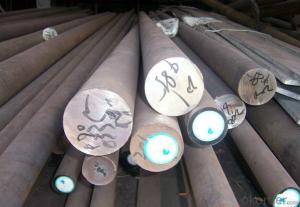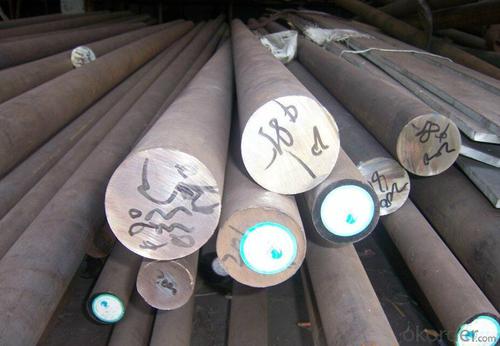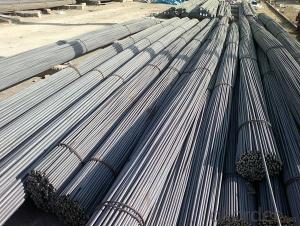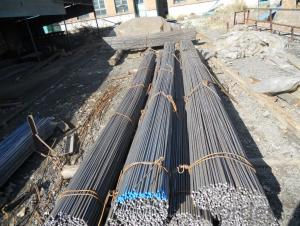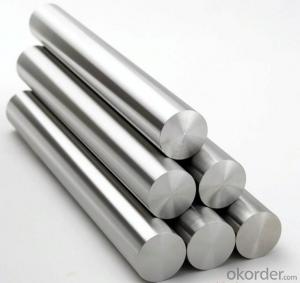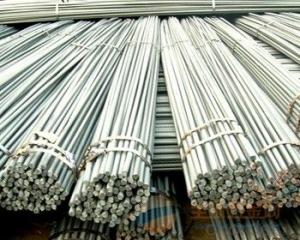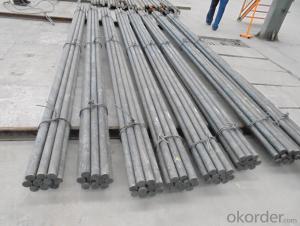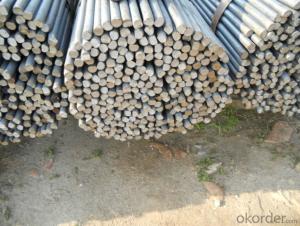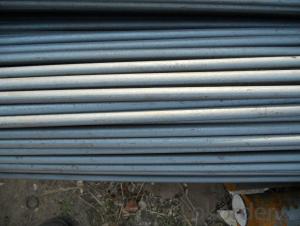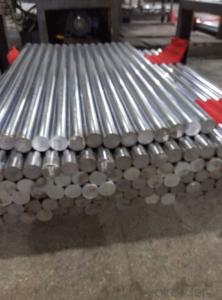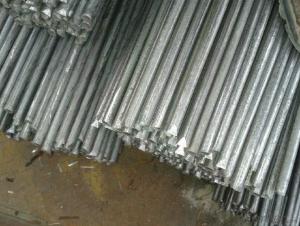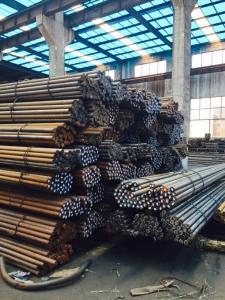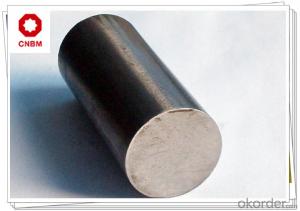SS400 Round Bar Chromed Steel Round Bar-Steel Round Bar
- Loading Port:
- Tianjin
- Payment Terms:
- TT OR LC
- Min Order Qty:
- 25 m.t.
- Supply Capability:
- 20000 m.t./month
OKorder Service Pledge
OKorder Financial Service
You Might Also Like
Specification
Product Description:
OKorder is offering SS400High quality Round Bar Chromed Steel Round Bar-Steel Round Bar Sat great prices with worldwide shipping. Our supplier is a world-class manufacturer of steel, with our products utilized the world over. OKorder annually supplies products to European, North American and Asian markets. We provide quotations within 24 hours of receiving an inquiry and guarantee competitive prices.
Product Applications:
SS400 Round Bar Chromed Steel Round Bar-Steel Round Bar are ideal for structural applications and are widely used in the construction of buildings and bridges, and the manufacturing, petrochemical, and transportation industries.
Product Advantages:
OKorder's SS400 Round Bar Chromed Steel Round Bar-Steel Round Bar are durable, strong, and resist corrosion.
Main Product Features:
· Premium quality
· Prompt delivery & seaworthy packing (30 days after receiving deposit)
· Corrosion resistance
· Can be recycled and reused
· Mill test certification
· Professional Service
· Competitive pricing
Product Description:
Specifications of High Quality Round Bar
1. Grade: GB, JIS, ASTM, EN
2. Grade: Q235, SS400, A36, S235JR
3. Diameter and mass: As below
Diameter | Mass | Diameter | Mass | Diameter | Mass |
(mm) | (kg/m) | (mm) | (kg/m) | (mm) | (kg/m) |
6 | 0.22 | 22 | 2.98 | 53 | 17.30 |
7 | 0.30 | 24 | 3.55 | 56 | 19.30 |
8 | 0.40 | 25 | 3.85 | 60 | 22.20 |
9 | 0.50 | 26 | 4.17 | 63 | 24.50 |
10 | 0.62 | 28 | 4.83 | 65 | 26.00 |
11 | 0.75 | 30 | 5.55 | 70 | 30.20 |
12 | 0.89 | 32 | 6.31 | 75 | 34.70 |
13 | 1.04 | 34 | 7.13 | 80 | 39.50 |
14 | 1.21 | 36 | 7.99 | 85 | 44.50 |
15 | 1.39 | 38 | 8.90 | 90 | 49.90 |
16 | 1.58 | 40 | 9.86 | 95 | 55.60 |
17 | 1.78 | 42 | 10.90 | 100 | 61.70 |
18 | 2.00 | 45 | 12.50 | 120 | 88.85 |
19 | 2.23 | 48 | 14.20 | 140 | 120.93 |
20 | 2.47 | 50 | 15.40 | 150 | 138.82 |
4. Material: Mild Steel
5. Heat treatment of high quality steel:
Fire: Isothermal annealing temperature is 800 ~ 880 °C, with 10 ~ 20 °C, the furnace cooling to about 600 °C, hardness above HB269.
FAQ:
Q1: Why buy Materials & Equipment from OKorder.com?
A1: All products offered byOKorder.com are carefully selected from China's most reliable manufacturing enterprises. Through its ISO certifications, OKorder.com adheres to the highest standards and a commitment to supply chain safety and customer satisfaction.
Q2: How do we guarantee the quality of our products?
A2: We have established an advanced quality management system which conducts strict quality tests at every step, from raw materials to the final product. At the same time, we provide extensive follow-up service assurances as required.
Q3: Can stainless steel rust?
A3: Stainless does not "rust" as you think of regular steel rusting with a red oxide on the surface that flakes off. If you see red rust it is probably due to some iron particles that have contaminated the surface of the stainless steel and it is these iron particles that are rusting. Look at the source of the rusting and see if you can remove it from the surface.
Images:
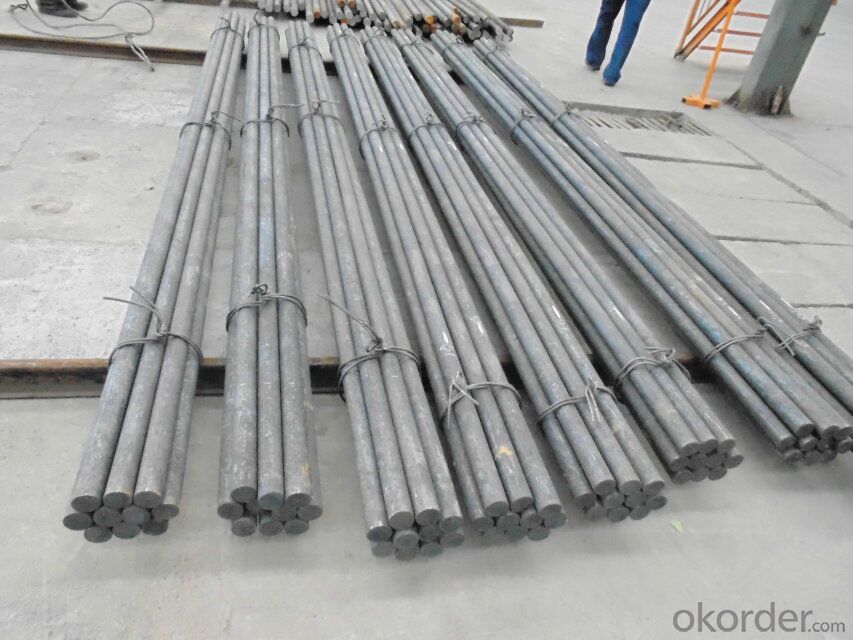
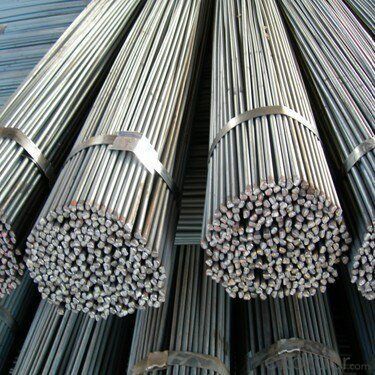
- Q: Can steel round bars be used in the agricultural machinery industry?
- Yes, steel round bars can be used in the agricultural machinery industry. Steel round bars are commonly used in the manufacturing of various components and parts for agricultural machinery such as tractors, harvesters, and tillage equipment. They provide strength, durability, and resistance to wear and tear, making them suitable for the demanding conditions in agriculture.
- Q: Are steel round bars suitable for use in the manufacturing of springs?
- Indeed, steel round bars prove to be a fitting choice when it comes to the fabrication of springs. The widespread use of steel round bars in spring production is owed to their exceptional sturdiness and longevity. The bar's circular form facilitates effortless bending and molding into diverse spring patterns. Moreover, steel boasts exceptional elasticity, rendering it an optimal material for springs that must absorb and retain mechanical energy. Furthermore, steel round bars exhibit commendable resistance to corrosion, an essential attribute for springs subjected to environmental elements. On the whole, steel round bars possess the essential qualities requisite for the creation of superior and dependable springs.
- Q: Can steel round bars be used for making hydraulic cylinders or pistons?
- Absolutely! Hydraulic cylinders or pistons can definitely be made using steel round bars. Steel, being a robust and long-lasting material, has the ability to endure the immense pressures and heavy loads that hydraulic cylinders and pistons usually encounter. It is possible to machine or shape the steel round bars into the desired dimensions for the hydraulic cylinder or piston. Furthermore, steel possesses excellent corrosion resistance properties, which is crucial for hydraulic systems that may come into contact with moisture or other corrosive substances. All in all, steel round bars are an ideal choice of material for the production of hydraulic cylinders and pistons.
- Q: Can steel round bars be used in the manufacturing of appliances?
- Yes, steel round bars can be used in the manufacturing of appliances. Steel is a durable and versatile material that can be shaped into different forms, including round bars, which can be used for various purposes in appliance manufacturing such as structural support, handles, or components.
- Q: What is the tensile strength of Q235 round steel?
- According to the national standard of GB 13013-1991 reinforced hot rolled round steel bars,Q235 reinforcement
- Q: What are the different packaging options for steel round bars?
- There are several packaging options available for steel round bars, depending on the specific needs and requirements of the customer. Some of the common packaging options include: 1. Bundles: Steel round bars are often bundled together using steel straps or wire to create a compact and secure package. Bundles can vary in size, with common options being 2, 3, 4, or 5 tons. This packaging option is suitable for transportation and storage purposes. 2. Wooden Crates: For added protection during transportation, steel round bars can be packed in wooden crates. These crates are designed to withstand the weight and size of the bars, ensuring safe delivery to the customer. 3. Steel Cages: In some cases, steel round bars are packaged in steel cages or racks to provide additional stability and security during transportation. These cages are typically made of sturdy steel and are stackable, making them suitable for storage purposes as well. 4. Plastic Wrapping: To protect the steel round bars from moisture, dust, and other contaminants, they can be wrapped in plastic or shrink wrap. This packaging option is commonly used when the bars are stored or transported in open-air environments. 5. Customized Packaging: Depending on the customer's specific requirements, steel round bars can be packaged in custom-designed containers or crates. These can be tailored to accommodate different sizes, weights, and quantities of bars, ensuring maximum convenience and safety during handling and transportation. It is important to note that the choice of packaging option may vary depending on factors such as the destination, mode of transportation, and specific industry standards. Therefore, it is advisable for customers to consult with their suppliers or packaging experts to determine the most suitable packaging option for their steel round bars.
- Q: What is the difference between a cold-drawn and a polished steel round bar?
- A cold-drawn steel round bar and a polished steel round bar differ in their manufacturing processes and resulting properties. A cold-drawn steel round bar is produced by pulling or drawing a hot-rolled steel bar through a die or series of dies to reduce its diameter and increase its length. This process is done at room temperature, which imparts certain characteristics to the steel. Cold-drawn steel bars have a smooth and shiny surface, with tight dimensional tolerances and improved mechanical properties. The cold drawing process refines the microstructure of the steel, making it stronger, more uniform, and less prone to defects. These bars are commonly used in applications that require high strength, precision, and resistance to fatigue, such as automotive components, machinery, and tooling. On the other hand, a polished steel round bar undergoes a different treatment process. After the steel bar is formed, it goes through polishing, which involves grinding or buffing the surface to achieve a smooth and reflective finish. Polished steel bars have a shiny and mirror-like appearance due to the removal of surface imperfections and contaminants. This process is primarily done for aesthetic purposes and does not significantly alter the mechanical properties of the steel. Polished steel round bars are commonly used in decorative applications, architectural designs, and furniture. In summary, the main difference between a cold-drawn and a polished steel round bar lies in their manufacturing processes and intended applications. Cold-drawn bars undergo a precise cold drawing process to improve their mechanical properties, while polished bars are subjected to surface polishing for an aesthetically pleasing finish.
- Q: Can steel round bars be used for making handrails?
- Yes, steel round bars can be commonly used for making handrails due to their durability and strength.
- Q: Are steel round bars available in different lengths?
- Yes, steel round bars are available in different lengths.
- Q: What are the different grades of tool steel round bars?
- Various grades of tool steel round bars are offered, each possessing unique properties and characteristics tailored to specific applications. Examples of these grades include: 1. W1: With its relatively low carbon content, W1 is a water-hardening tool steel renowned for its exceptional toughness and good wear resistance. It finds common usage in cutting tools and woodworking tools. 2. O1: O1 tool steel round bars are oil-hardening tool steel boasting high carbon content. They exhibit excellent wear resistance, high toughness, and exceptional dimensional stability. O1 tool steel is frequently employed for punches, dies, and cutting tools. 3. A2: A2 tool steel round bars are air-hardening tool steel with moderate carbon and chromium content. They offer good wear resistance, superior toughness, and high dimensional stability. A2 tool steel is a popular choice for blanking and forming dies, as well as shear blades. 4. D2: D2 tool steel round bars are characterized by their high carbon and chromium content, providing outstanding wear resistance and good toughness. They exhibit remarkable resistance to abrasive wear and are commonly utilized in the production of cutting tools, punches, and forming dies. 5. M2: High-speed M2 tool steel round bars are enriched with a notable amount of tungsten, molybdenum, and vanadium. They deliver exceptional wear resistance, high red hardness, and good toughness. M2 tool steel is typically employed for high-speed cutting tools, drill bits, and machining tools. 6. S7: S7 tool steel round bars are air-hardening shock-resistant tool steel. They possess high impact toughness, good wear resistance, and excellent heat resistance. S7 tool steel is frequently applied in applications necessitating high shock resistance, such as chisels and hammers. These are merely a few instances of the diverse grades of tool steel round bars available in the market. The choice of grade hinges on factors such as the specific application, desired hardness, wear resistance, toughness, and heat resistance required. It is crucial to seek guidance from a knowledgeable supplier or metallurgist to ascertain the most appropriate grade for a given application.
Send your message to us
SS400 Round Bar Chromed Steel Round Bar-Steel Round Bar
- Loading Port:
- Tianjin
- Payment Terms:
- TT OR LC
- Min Order Qty:
- 25 m.t.
- Supply Capability:
- 20000 m.t./month
OKorder Service Pledge
OKorder Financial Service
Similar products
Hot products
Hot Searches
Related keywords
